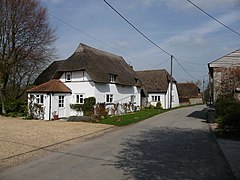Nether Wallop
| Nether Wallop | |
|---|---|
 Thatched cottage |
|
| Nether Wallop shown within Hampshire | |
| Population | 876 (2011 Census) |
| OS grid reference | SU2996536570 |
| Civil parish |
|
| District | |
| Shire county | |
| Region | |
| Country | England |
| Sovereign state | United Kingdom |
| Post town | STOCKBRIDGE |
| Postcode district | SO20 |
| Dialling code | 01264 |
| Police | Hampshire |
| Fire | Hampshire |
| Ambulance | South Central |
| EU Parliament | South East England |
| UK Parliament | |
| Website | The Wallops |
Nether Wallop is a village and civil parish in the Test Valley district of Hampshire, England. It is located approximately 3.7 miles (6 km) northwest of , and approximately 7 miles (11 km) southwest of Andover.
Nether Wallop is the easternmost of the three villages collectively known as The Wallops, the other two being Over Wallop and Middle Wallop. The name "Wallop" derives from the Old English words waella and hop, which taken together roughly mean "the valley of springing water".
The village was the site of the Battle of Guoloph that took place around AD 440. The element 'Wallop' is first attested in the Domesday Book of 1086 as 'Wallope', while Nether Wallop is first attested as 'Wollop inferior' c. 1270 in Episcopal Registers.
Nether Wallop contains many old thatched cottages, and has been featured in books and TV programmes as one of the prettiest villages in England. In particular, Dane Cottage in Five Bells Lane was used as Miss Marple's home in the village of St. Mary Mead for the BBC TV adaptations of the Agatha Christie novels. The house and many of the surrounding lanes within the village were used as the setting and are commonly seen throughout many of the Miss Marple films.
Sir Richard Reade (1511-1575), Lord Chancellor of Ireland, was a native of Nether Wallop, where his family were Lords of the Manor for several generations.
The conductor Leopold Stokowski died at his home in Nether Wallop on 13 September 1977.
The church of St Andrew is partly Anglo-Saxon, and unique fragments of frescoes apparently dating to the late Anglo-Saxon period have been discovered.
...
Wikipedia

